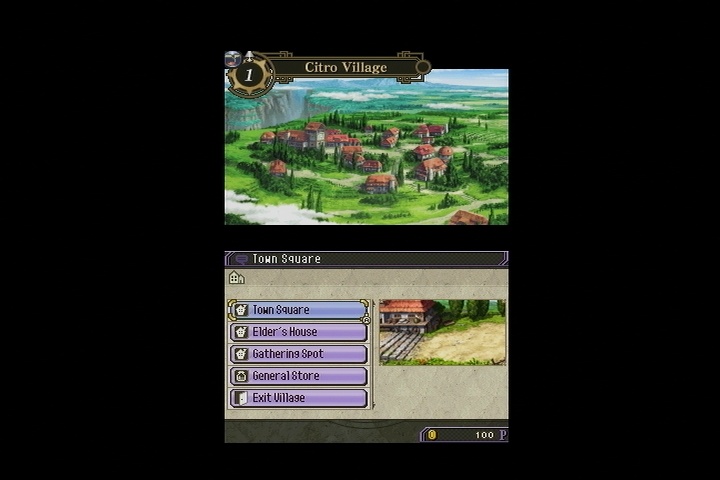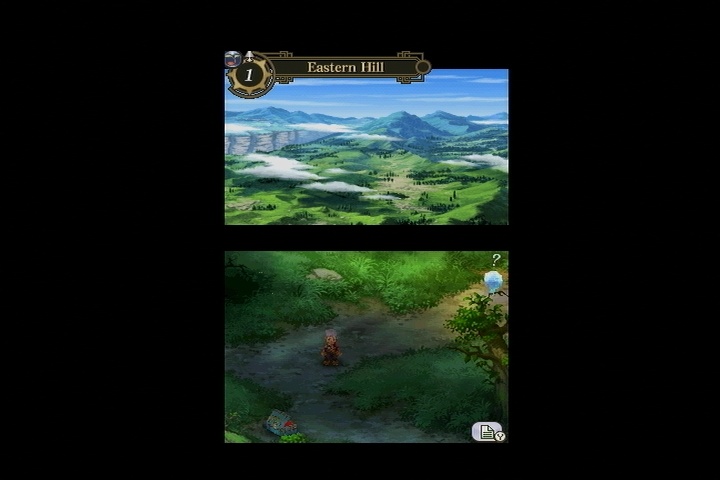The long-running Suikoden franchise has amassed a cult following with its continuous story and premise of recruiting up to 108 characters with whom to wage war. Suikoden Tierkreis, the first Suikoden game for the Nintendo DS, dares to break away from this canon, eschewing the prequel and side-story motifs for an entirely new collection of characters and worlds. To write off the game because of this, though, would be a mistake. Suikoden Tierkreis overcomes a somewhat lukewarm first impression to end up yet another strong role-playing experience on the DS.
While the original storyline has been abandoned, you're still able to recruit 108 characters referred to as "stars," and there's plenty in Tierkreis that will feel familiar if you're a fan of the series. The story is anime-inspired, with cut-and-dried antagonists--the One King, who wishes to unite everything into his domain, and his lackey, who will stop at nothing to make sure this happens. Then there's the main character, whose written dialogue makes him appear crude, impetuous, and obnoxious, but oh so spunky and optimistic. His one-dimensional personality and penchant to repeat his catchphrase "We'll never know unless we try!" ad nauseam do little to endear you to him, and it's a little disappointing to be shackled to him throughout your adventure.
In fact, the dialogue is serving after serving of empty calories in the form of pointless replies and attempts at witty repartee. Despite this, the events that unfold throughout the story are interesting. Masses of land are appearing out of thin air, displacing what used to occupy that same space. Certain factions who are fighting for or against the One King's order aren't always transparent, leaving you to occasionally wonder what their true motivations are. While not entirely original for the role-playing genre, it still manages to carry an air of intrigue.
The battle system is a familiar turn-based, menu-driven affair requiring little tactical thought, since even many of the bosses do no more than hit you hard and fast. There's a lack of emphasis on status effects (blindness and paralysis, for instance) and other such subtleties that you'd find in similar games. There are combo attacks that are available only when certain members are grouped together in your party, but even those are easily abused with little penalty or tactical consideration.
Whatever tactical considerations are lost during battles themselves, at least you're required to make them beforehand. You and your companions engage in a handful of sieges throughout the game, requiring you to put together two or more teams that will each take on a different attack angle. You'll have to consider the special abilities and weapons that make up each party--remembering to bring healers, equipping the most appropriate special abilities (you're limited to four per character), and balancing brute force with elemental attacks and defensive buffs.

You may be initially turned off by the travel system in Tierkreis, which limits your exploration to dungeons and towns that you travel between simply clicking their icons on the map. Even walking to key areas of a town is done via menus. This is all an effort to streamline what could grow monotonous throughout a long adventure, which is a fair sacrifice considering how many characters you can recruit. The story often forces the use of certain party members for the sake of plot progression, but it has the side effect of ensuring that you don't "forget" to level up underused characters. Because these missions have you carrying along only one or two mandatory characters at a time, you're not completely limited in terms of whom you bring with you in your party of four. Underleveled characters can also catch up remarkably quickly, and it's a safe bet that a good number of the characters will be fairly balanced by game's end.
Missions and sieges can be relatively short--sometimes requiring only two battles and an intense boss fight--so you feel as if you've accomplished a lot in a short period of time. Later in the game, new characters seem to be joining your cause left and right. Admittedly, the experience is cheapened at times. Some join after you've endured only a little plot progression, without combat or travel. You'll also experience false starts, where your characters will express excitement over an upcoming siege--for which you'll even go so far as to form your parties--that ends up being nothing more than plot exposition. The game can feel a little easy as a result. Still, it's a welcome change from incessant level- or cash-grinding.
If nothing else, the presentation makes it easy to forget about whatever qualms you might have with the lack of difficulty or the annoying dialogue. With polygonal characters atop prerendered backgrounds, Tierkreis often looks stunning. Pockets of shadow and light appropriately accentuate people as they walk by. Bricks, grass, and streams are sharply rendered and pop off the screen. You're treated to a variety of vistas both mundane and exotic, from Middle Eastern influences to enormous, vividly colored seashell structures. Important plot points are emphasized with well-animated cutscenes, which are marred only by some noticeable compression artifacts.
Tierkreis' inconsistent voice acting kicks in during these scenes, as well as in key game-engine cutscenes, and will make you squirm at the main character even more. His voice actor sounds like he's trying to speed-read every line, and other characters are either monotone or too over the top. The thuds, slashes, and spell effects of battle, on the other hand, pack a nice punch. Tierkreis' music is perhaps the strongest aspect of the presentation. Both the composition and the instrumentation are exquisite and varied, ranging from heroic, powerful violin solos to delicate, entrancing string and woodwind arrangements.

Konami tops the experience off by giving you the option to play the game with only the touch screen, which works well. It's also compatible with the Nintendo Wi-Fi Connection, through which you can send and receive characters for certain missions. It's an admirable effort toward making Tierkreis a strong community experience, but the one caveat is that online communication isn't available from the get-go. In fact, you need to find a special character that gives you this access. Instead of going for potentially tens of hours on end before gaining the ability to connect, it would have been much simpler to have your main quest-handler offer you that ability.
Despite its Wi-Fi gaffe, its deviation from the Suikoden canon, and its lack of innovation, Suikoden Tierkreis doesn't seem as if it should be all that special of an experience. Yet, as you come to grips with whatever small grievances you start out with, there's a good chance you'll have a great experience by the time you complete its 40-hour-plus adventure. With a brisk pace that almost guarantees you will never get bogged down and wonderful aesthetics, Suikoden Tierkreis is a great introduction to the franchise for Nintendo DS owners.